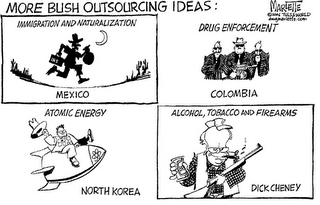Hold the Bush Bastards Accountable !

Bush's Crimes
Since George W. Bush came to power, he has systematically flouted international agreements that the US had previously signed up to. While previous US administrations might not be able to claim much better records, it is clear that Bush is not even making an attempt to stick to these numerous treaties, laws and obligations.
Rogue State
List of International Obligations violated by George W. Bush
US as nuclear rogue
International Law Relating to nuclear weapons: International Court of Justice Advisory Opinion Anti-Ballistic Missile Treaty Non Proliferation Treaty Geneva Conventions Protocol UN Charter US Constitution. (source: IEER)
Environmental Agreements: Failure to Ratify Kyoto Agreement on Climate Change: (source: NRDC) Framework Convention on Tobacco Control

America as Nuclear Rogue,
NY Times Editorial
If another country were planning to develop a new nuclear weapon and contemplating pre-emptive strikes against a list of non-nuclear powers, Washington would rightly label that nation a dangerous rogue state. Yet such is the course recommended to President Bush by a new Pentagon planning paper that became public last weekend. Mr. Bush needs to send that document back to its authors and ask for a new version less menacing to the security of future American generations.

International Court of Justice Advisory Opinion on the Legality of the Threat or Use of Nuclear Weapons
July 8, 1996
A threat or use of nuclear weapons should also be compatible with the requirements of the international law applicable in armed conflict particularly those of the principles and rules of international humanitarian law, as well as with specific obligations under treaties and other undertakings which expressly deal with nuclear weapons. passed unanimously
It follows from the above mentioned requirements that the threat or use of nuclear weapons would generally be contrary to the rules of international law applicable in armed conflict, and in particular the principles and rules of humanitarian law. seven votes to seven, passed by the President's casting vote
There exists an obligation to pursue in good faith and bring to a conclusion negotiations leading to nuclear disarmament in all its aspects under strict and effective international control, passed unanimously.

United States Constitution
Adopted September 17, 1787
US Rogue State
1. In December 2001, the United States officially withdrew from the 1972 Antiballistic Missile Treaty, gutting the landmark agreement-the first time in the nuclear era that the US renounced a major arms control accord.
2. 1972 Biological and Toxin Weapons Convention ratified by 144 nations including the United States. In July 2001 the US walked out of a London conference to discuss a 1994 protocol designed to strengthen the Convention by providing for on-site inspections. At Geneva in November 2001, US Undersecretary of State John Bolton stated that "the protocol is dead," at the same time accusing Iraq, Iran, North Korea, Libya, Sudan, and Syria of violating the Convention but offering no specific allegations or supporting evidence.
3. UN Agreement to Curb the International Flow of Illicit Small Arms, July 2001: the US was the only nation to oppose it.
4. April 2001, the US was not re-elected to the UN Human Rights Commission, after years of withholding dues to the UN (including current dues of $244 million)-and after having forced the UN to lower its share of the UN budget from 25 to 22 percent. (In the Human Rights Commission, the US stood virtually alone in opposing resolutions supporting lower-cost access to HIV/AIDS drugs, acknowledging a basic human right to adequate food, and calling for a moratorium on the death penalty.)
5. International Criminal Court (ICC) Treaty, to be set up in The Hague to try political leaders and military personnel charged with war crimes and crimes against humanity. Signed in Rome in July 1998, the Treaty was approved by 120 countries, with 7 opposed (including the US). In October 2001 Great Britain became the 42nd nation to sign. In December 2001 the US Senate again added an amendment to a military appropriations bill that would keep US military personnel from obeying the jurisdiction of the proposed ICC.
6. Land Mine Treaty, banning land mines; signed in Ottawa in December 1997 by 122 nations. The United States refused to sign, along with Russia, China, India, Pakistan, Iran, Iraq, Vietnam, Egypt, and Turkey. President Clinton rejected the Treaty, claiming that mines were needed to protect South Korea against North Korea's "overwhelming military advantage." He stated that the US would "eventually" comply, in 2006; this was disavowed by President Bush in August 2001.
7. Kyoto Protocol of 1997, for controlling global warming: declared "dead" by President Bush in March 2001. In November 2001, the Bush administration shunned negotiations in Marrakech (Morocco) to revise the accord, mainly by watering it down in a vain attempt to gain US approval.
8. In May 2001, refused to meet with European Union nations to discuss, even at lower levels of government, economic espionage and electronic surveillance of phone calls, e-mail, and faxes (the US "Echelon" program),
9. Refused to participate in Organization for Economic Co-operation and Development (OECD)-sponsored talks in Paris, May 2001, on ways to crack down on off-shore and other tax and money-laundering havens.
10. Refused to join 123 nations pledged to ban the use and production of anti-personnel bombs and mines, February 2001
11. September 2001: withdrew from International Conference on Racism, bringing together 163 countries in Durban, South Africa
12. International Plan for Cleaner Energy: G-8 group of industrial nations (US, Canada, Japan, Russia, Germany, France, Italy, UK), July 2001: the US was the only one to oppose it.
13. Enforcing an illegal boycott of Cuba, now being made tighter. In the UN in October 2001, the General Assembly passed a resolution, for the tenth consecutive year, calling for an end to the US embargo, by a vote of 167 to 3 (the US, Israel, and the Marshall Islands in opposition).
14. Comprehensive [Nuclear] Test Ban Treaty. Signed by 164 nations and ratified by 89 including France, Great Britain, and Russia; signed by President Clinton in 1996 but rejected by the Senate in 1999. The US is one of 13 nonratifiers among countries that have nuclear weapons or nuclear power programs. In November 2001, the US forced a vote in the UN Committee on Disarmament and Security to demonstrate its opposition to the Test Ban Treaty.
15. In 1986 the International Court of Justice (The Hague) ruled that the US was in violation of international law for "unlawful use of force" in Nicaragua, through its actions and those of its Contra proxy army. The US refused to recognize the Court's jurisdiction. A UN resolution calling for compliance with the Court's decision was approved 94-2 (US and Israel voting no).
16. In 1984 the US quit UNESCO (UN Educational, Scientific and Cultural Organization) and ceased its payments for UNESCO's budget, over the New World Information and Communication Order (NWICO) project designed to lessen world media dependence on the "big four" wire agencies (AP, UPI, Agence France-Presse, Reuters). The US charged UNESCO with "curtailment of press freedom," as well as mismanagement and other faults, despite a 148-1 in vote in favor of NWICO in the UN. UNESCO terminated NWICO in 1989; the US nonetheless refused to rejoin. In 1995 the Clinton administration proposed rejoining; the move was blocked in Congress and Clinton did not press the issue. In February 2000 the US finally paid some of its arrears to the UN but excluded UNESCO, which the US has not rejoined.
17. Optional Protocol, 1989, to the UN's International Covenant on Civil and Political Rights, aimed at abolition of the death penalty and containing a provision banning the execution of those under 18. The US has neither signed nor ratified and specifically exempts itself from the latter provision, making it one of five countries that still execute juveniles (with Saudi Arabia, Democratic Republic of Congo, Iran, Nigeria). China abolished the practice in 1997, Pakistan in 2000.
18. 1979 UN Convention on the Elimination of All Forms of Discrimination against Women. The only countries that have signed but not ratified are the US, Afghanistan, Sao Tome and Principe.
19. The US has signed but not ratified the 1989 UN Convention on the Rights of the Child, which protects the economic and social rights of children. The only other country not to ratify is Somalia, which has no functioning government.
20. UN International Covenant on Economic, Social and Cultural Rights, 1966, covering a wide range of rights and monitored by the Committee on Economic, Social and Cultural Rights. The US signed in 1977 but has not ratified.
21. UN Convention on the Prevention and Punishment of the Crime of Genocide, 1948. The US finally ratified in 1988, adding several "reservations" to the effect that the US Constitution and the "advice and consent" of the Senate are required to judge whether any "acts in the course of armed conflict" constitute genocide. The reservations are rejected by Britain, Italy, Denmark, the Netherlands, Spain, Greece, Mexico, Estonia, and others.
Waay more at: http://www.motherearth.org/bushwanted/laws.php
 Framework Convention on Tobacco Control
Framework Convention on Tobacco ControlThe Bush administration has also declined to sign the Framework Convention on Tobacco Control, sign a World Health Organisation treaty with the aim of reducing the 4 million people who die from tobacco related diseases every year. Bush did this because of the donations he recieved from the tobacco companies and is one of the few countries not to sign. Tobacco could be called the biggest weapon of mass destruction...
This page is hosted For Mother Earth
...
This sick narcissistic psychopathic administration has rippled throughout the world, with copy cat governments and crooked corporations having a field day.
It is time to tell the Bush Cheney RNC crime syndicate - "the party is OVER boys - you are under arrest!"


0 Comments:
Post a Comment
<< Home